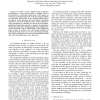Free Online Productivity Tools
i2Speak
i2Symbol
i2OCR
iTex2Img
iWeb2Print
iWeb2Shot
i2Type
iPdf2Split
iPdf2Merge
i2Bopomofo
i2Arabic
i2Style
i2Image
i2PDF
iLatex2Rtf
Sci2ools
100
click to vote
ICRA
2005
IEEE
2005
IEEE
Loop Closing in Topological Maps
— In order to create consistent maps of unknown environments, a robot must be able to recognize when it has returned to a previously visited place. In this paper, we introduce an evidential approach to the loop-closing problem for topological maps, based on the Dempster-Shafer theory of evidence. In our approach, the robot makes a hypothesis whenever it may have revisited a place. It then attempts to verify hypotheses by continuing to traverse the environment, gathering evidence that supports (or refutes) the hypotheses. We describe methods for managing belief about multiple loopclosing hypotheses, and for determining a belief assignment given a piece of evidence. We also discuss methods for reducing the false alarm rate of our loop-closing algorithm, and provide simulated and real-world experimental results that verify the effectiveness of our approach.
Related Content
| Added | 25 Jun 2010 |
| Updated | 25 Jun 2010 |
| Type | Conference |
| Year | 2005 |
| Where | ICRA |
| Authors | Kristopher R. Beevers, Wesley H. Huang |
Comments (0)

